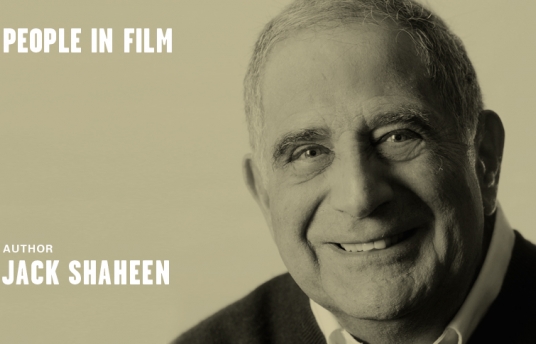People in Film: Jack Shaheen
Jul 03, 2012

Jack Shaheen is a leading authority on the image of Arabs and Muslims in American popular culture, and has documented some 1,200 films. He’s the 77 year old American author of several books including, most famously, ‘Reel Bad Arabs: How Hollywood Vilifies a People’. He’s also worked as a consultant for film and television.
As part of Mythology Fortnight, we spoke to him about the origins and popularity of stereotypes. We also used the opportunity to ask for advice for filmmakers in the region, and beyond.

Images of Arabs from Hollywood films, courtesy of reelbadarabs.com
DFI: You painted a dark picture of a place called ‘Arab Land’ six years ago in a documentary based on your book ‘Reel Bad Arabs’. You said:
“We know the mythology, the mythology namely of Hollywood’s image of Arabs. We inherited the Arab image primarily from Europeans. In the early days maybe 150, 200 years ago, the British and the French who travelled to the Middle East and those who didn’t travel to the Middle East conjured up these images of the Arab as the oriental other. The travel writers, the artists who fabricated these images were very successful…These images were transmitted and inherited by us. We took them, we embellished them, and here they are.
We have this fictional setting called ‘Arab Land’, a mythical theme park.”
Ominous music plays, belly-dancers entertain, male leaders degrade women and villains find unimaginable ways to terrorise their victims in ‘Arab Land’, you explained. Is this still true?
Shaheen: It’s as true today as it was back then. The setting is basically the same; you always begin with the desert. The action is something different; instead of camels, you have tanks – the weaponry is different. The cast of characters is basically the same, although instead of Bedouins who act like savages you have villains who are more vicious.
DFI: Did this portrayal begin with mythological stories?
Shaheen: The mythology, certainly ‘The Arabian Nights’, had a lot to do with it…But I don’t think it was as vindictive back then as it has been in the last 50 years.
DFI: Which adaptations stand out to you as massively inaccurate or negative?
Shaheen: “Aladdin” is the classic example. If you look at different versions of “The Desert Song” (1929, 1942, 1953), the Arabs just became more and more vindictive. If you look at the first version of “The Thief of Baghdad” it was absolutely beautiful; versions are not nearly as good. If you watch “King Richard and the Crusaders” with Rex Harrison who plays Saladin and then “Kingdom of Heaven” (where Ghassan Massoud plays Saladin), you’re going to prefer “King Richard and the Crusaders” – it’s a better film, it’s a great film, we just don’t see it.
DFI: But films rarely have much to do with their original myths. What’s the problem with eastern mythology specifically?
Shaheen: (Filmmakers in Hollywood) embellish the genuine myth for a western audience and hype up the villains. Then they make the heroes as western as possible. A few years ago DreamWorks came out with a Sinbad movie you didn’t even know Sinbad was an Arab. He could have been anyone.
DFI: What’s the reason for this? Is it a political strategy?
Shaheen: Politics and money.
DFI: Don’t Arabs tend to enjoy these images too? “Aladdin” wasn’t only popular in America…
Shaheen: They have grown accustomed to the face, to the stereotype. When something isn’t so bad you think: ‘how wonderful’. Part of my job is, and it’s difficult, is to teach Arabs and Muslims to see this image. There’s a vast majority of people out there that do not see or understand.
DFI: Many actors of Arab origin try to make it in Hollywood. What is your advice for those who are conflicted about how their roles may propagate stereotypes?
Shaheen: Take the role and then try to use your influence once you’re on set to soften, or even eradicate, some of the stereotypical dialogue. As an actor you’re obliged to take the role; if you don’t take it, someone else will.
I know Ahmed Ahmed very well and we have discussed this with some other Arab American actors. We’re all in agreement on this particular issue.
DFI: There’s a rising interest in the region to preserve old fairytales originating from the Gulf and wider Arab region. How would you advise filmmakers who are interested in protecting this history?
Shaheen: You have to have a good screenwriter and a good cast…It’s always in the script. The script dictates whether or not it will be successful.
DFI: How do you become a good writer?
Shaheen: You learn from other writers from other films, and you keep re-writing. I re-write, re-write, re-write, re-write, re-write – that’s my life.
DFI: I’m 18, live in Doha and desperately want to be a filmmaker. What should I do?
Shaheen: You have to work and suffer work. The nice thing about suffering in Doha is you have good food.
DFI: What do you want to see happen in 10 years?
Shaheen: I’d like to see Arab Americans visit the theatre without being afraid they will be victimised.